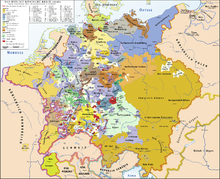C.V. Wedgwood The Thirty Years War
“I wrote this book in the thirties, against the background of depression at home and mounting tension abroad. The preoccupations of that unhappy time cast their shadows over its pages.”

I first took up The Thirty Years War by C.V. Wedgwood ten years ago, and while I was caught up in this prodigious work of scholarship, which undid so many preconceptions I had learned in history class, I had to put it aside because I just couldn’t grok the fullness of the tragedy that it presents to the modern reader..
I got as far as this passage about the condition of Germany (and all of Europe) before the war began:
“The outlook even of the educated was harsh. Underneath a veneer of courtesy, manners were primitive; drunkenness and cruelty were common in all classes, judges were more often severe than just, civil authority more often brutal than effective, and charity came limping far behind the needs of the people.
“Discomfort was too natural to provoke comment; winter’s cold and summer’s heat found European man lamentably unprepared, his houses too damp and draughty for the one, too airless for the other.
“Prince and beggar were alike inured to the stink of offal [guts] in the streets, of foul drainage about the houses, to the sight of carrion birds picking over public refuse dumps or rotten bodies swinging on the gibbets.
“On the road from Dresden to Prague [92 miles] a traveller counted ‘above seven score [140] gallowses and wheels, where thieves were hanged, some fresh and some half rotten, and the carcases of murders broken limb after limb on the wheels.’”
Hard to imagine things getting worse, right? Wrong!
This month I took it up again and was rewarded with a host of new insights about this horrific conflict which wiped out more than half the population of Germany through famine, and plague.
But the tens of thousands of men killed in battle amounted to nothing out of the ordinary.

The worst depravities occurred when they were not fighting other soldiers and were looting the countryside. The murders, rapes, and tortures inflicted by bands of unpaid mercenaries on the undefended civilian population literally defy description. Men were spitted over open fires to force them to divulge their hidden treasure, excrement was forced down their throats.
It reminded me of my trip to Auschwitz and the mountain of hairbrushes that showed that people had been deprived of their humanity.
A father seeking justice for the rape and murder of his daughter was told she should not have been so “niggardly with her favours.”
And the Hapsburg emperor, Rudolph of Styria, was perfectly happy with this because he restored a few provinces of German to ‘the true faith.’ Seventy-five percent of the population was killed or displaced, but they’re all Catholics now.’
And it was all so stupid and needless.
“Morally subversive, economically destructive, socially degrading, confused in it its causes, devious in its course, futile in its result, it is the outstanding example in European history of meaningless conflict..”
